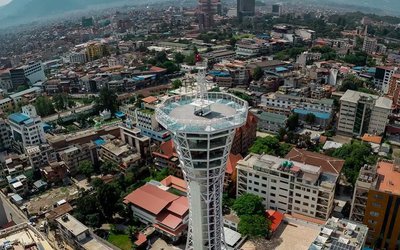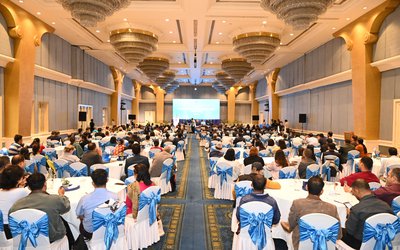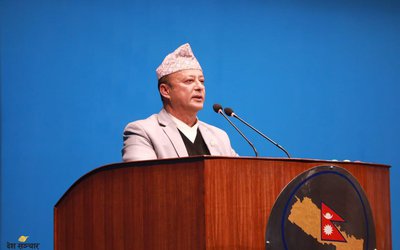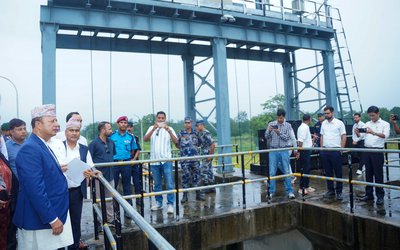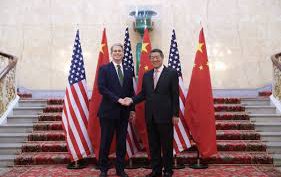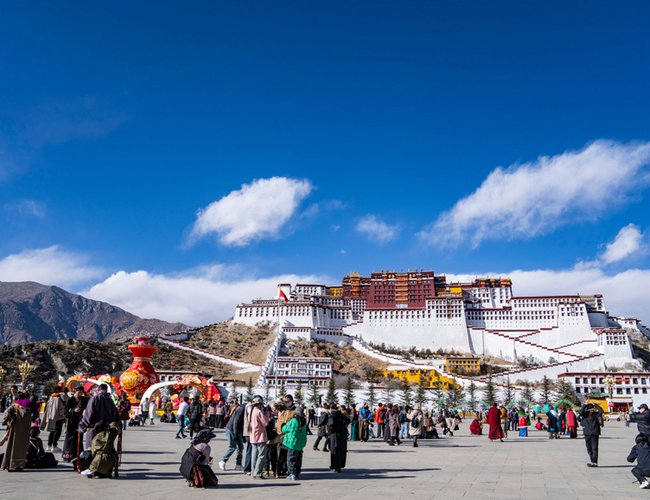
Sharachchandra Bhandary in Lhasa
The Xizang Autonomous Region (XAR) in China has made significant strides in combating poverty in recent years, with the growth of small and cottage industries playing a key role. As the Central Government and XAR prepare to celebrate the 60th anniversary of XAR's establishment, the region continues to progress towards peace, development, and prosperity.
Chhawa Tenjin, a resident of Bahe Township, used to struggle to find temporary work to support his family. The crops he grew on his small plot of land were not enough to feed his family of four.

Fortunately, ten years ago, the 50-year-old was hired by a local hospitality company, providing him with a stable income that eventually allowed him to start his own business.
After completing a three-month training program, Chhawa became a skilled worker and quickly rose to the position of team leader within two years. "I was earning 5,300 yuan per month, and I was very satisfied with my salary," he said.
He was among the 50+ local residents employed by the hospitality company, with more Bahe residents hopeful of escaping poverty as thousands of enterprises nationwide joined the fight against poverty in the region. These enterprises brought job opportunities and boosted the income of poor residents. With his savings, he started a restaurant business at the tourist spot. During the busy tourist season from May to October, he is too occupied to chat as both local and domestic tourists flock to Kadinggou scenic spot and its surroundings. He and his friends are pleased to have started similar businesses, and their earnings are sufficient to support their families. They are exempt from paying taxes on their income, which motivates them to sustain their businesses.
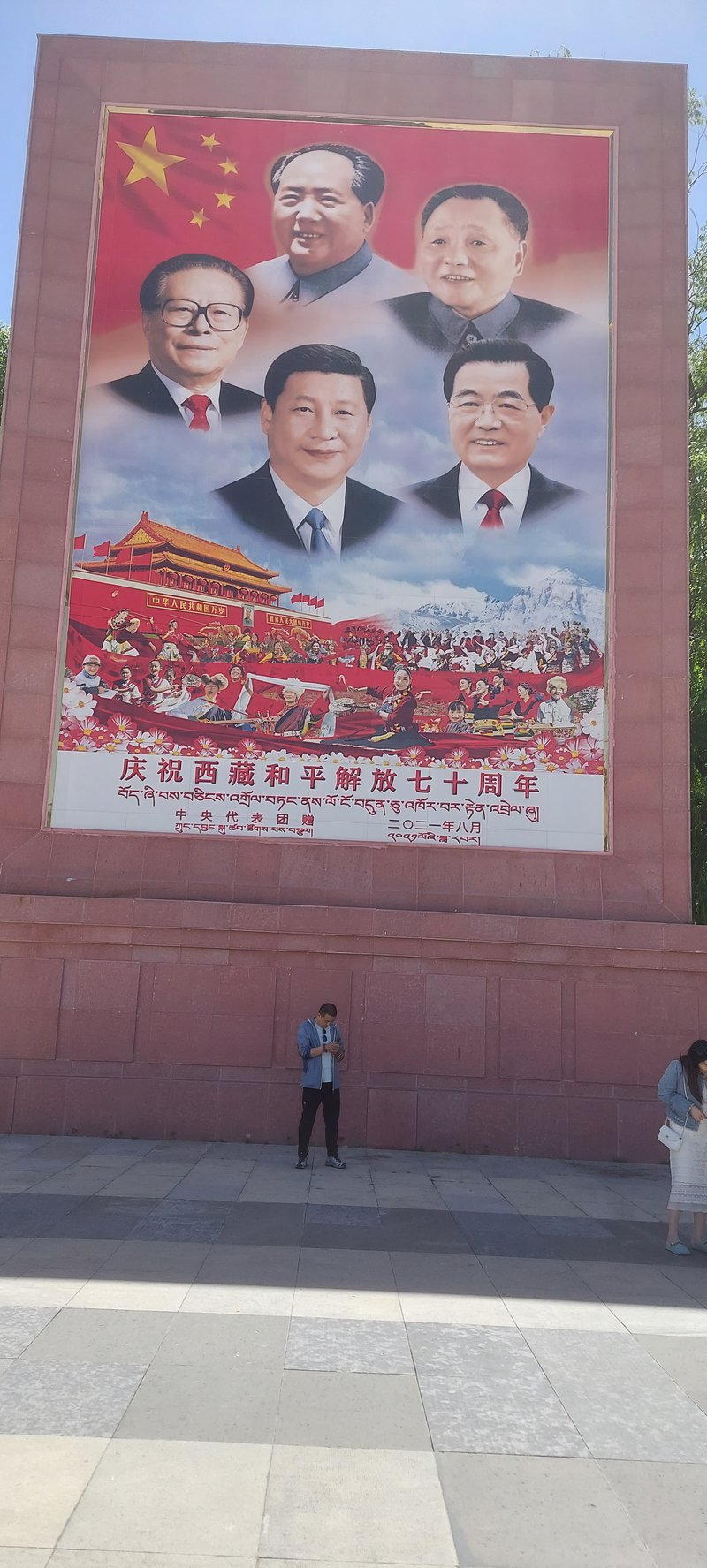
"The battle against poverty is one of the three crucial battles that the country must win to achieve a moderately prosperous society. Our priority is to improve the housing conditions, education, healthcare, and sanitation quality of impoverished people," says Suro Lang, Deputy Mayor of Xiga Village near Linzhi, a picturesque city in the southwest of the Xizng Autonomous Region. According to Suro, Xizang's development policy focuses on aligning with the national development policy, enhancing people's well-being, and promoting key industries. Xizang has been advancing key industries like clean energy, high-tech, and cultural and tourism sectors, which have become the drivers of local growth, creating a more resilient and self-sufficient economic model. The integration of industries, such as culture and tourism with agriculture, transportation, and commerce, has strengthened Xizang's capacity for self-development.
The central government has implemented special measures that have enhanced the quality of life in poverty-stricken counties, with a focus on ethnic minorities due to their lower population numbers. The main inhabitants of Xiga village are Mumba and Loba.
Laxmi Niraula, Nepal’s Consulate General, highlights the XAR's progress in poverty alleviation and development, including the eradication of absolute poverty and the implementation of a rural revitalization strategy. Key strategies such as targeted poverty alleviation, relocation from uninhabitable areas, ecological conservation compensation, and investments in education and social assistance have led to increased per capita income and improved living standards for previously impoverished populations.
Leelamani Paudyal, former Nepali Ambassador to China, notes the cooperation agreement between Nepal and China under the Belt and Road Initiative (BRI) to promote trans-Himalayan connectivity. Tourism is a crucial sector for Nepal's economy, with Pokhara being a popular destination, especially for Chinese visitors. The direct flight between Lhasa and Pokhara holds significant benefits for both countries.
Xizang's remarkable socio-economic transformation over the past seven decades is truly impressive. China's remarkable success in poverty alleviation is a historic achievement that deserves recognition. While acknowledging China's accomplishments, it is crucial to consider the potential for adopting similar successful strategies in our own context. China is willing to share its knowledge and experience with developing countries worldwide. As a close and friendly neighbor, Nepal has the opportunity to benefit from this. Nepal can draw valuable lessons from Xizang's development models and technology, as the topography, climate, culture, and development challenges in the northern region of Nepal are similar to those in Xizang.
Ambassador Paudyal believes that the significant investments in infrastructure, trade, agriculture, and poverty alleviation in Xizang will have positive effects on Nepal. The road network to Nepal's northern border is currently limited and basic, while a well-developed highway network exists towards Xizang. Nepal has been utilizing Xizang's highways for transporting food and construction materials along the northern border. Given this situation, the Nepalese government should consider creating a comprehensive program with a specific action plan and poverty alleviation targets along the northern Himalayan region, seeking expertise from China, among others, to implement such a plan. The high-quality development initiatives in Xizang may inspire Nepal to accelerate development in its own region. Nepal can boost its manufacturing and export capabilities by attracting investment and advanced technology from China in general, and Xizang in particular.

The per-capita income of individuals lifted out of poverty in Xizang reached 13,800 yuan (approximately 1,922 U.S. dollars) in 2022, showing faster growth than the region's per-capita income of rural residents, as stated in a government document released by China's State Council Information Office. Those who have been lifted out of poverty in Xizang now have access to food, clothing, housing, education, and medical care, improved living and working conditions, better infrastructure and basic public services, and a comprehensive social security system, according to the Office.
In 2024, Xizang's GDP increased by 6.3 percent, with social fixed asset investment rising by 19.6 percent, retail sales of consumer goods by 7.2 percent, and industrial added value of enterprises above designated size by 18.3 percent. The region's industrial structure is evolving towards greater diversification, shifting from natural resource-dependent and labor-intensive industries to more technology-driven and service-oriented sectors.
The region's GDP in 2022 reached 213.26 billion yuan (approximately 29.7 billion U.S. dollars), which is 2.28 times the 2012 figure when adjusted for constant prices. This growth reflects an average annual growth rate of 8.6 percent, ranking among the highest in China, according to the Office.
Furthermore, cultural development in Xizang has progressed alongside economic advancement, with the region's rich historical, cultural, and natural resources contributing to its global reputation as a significant tourism destination. The preservation and promotion of Xizang's culture, particularly its intangible cultural heritage, have been integral to the region's progress. The Potala Palace and the Jokhang Temple in Lhasa remain popular tourist attractions. The substantial investment and efforts put into the restoration and conservation of cultural, religious, and historical sites throughout Xizang have been remarkable. The dedication to safeguarding cultural and heritage sites as part of the world's shared heritage is commendable.
Bhandary serves as the Executive Editor of the National News Agency (RSS)
.


